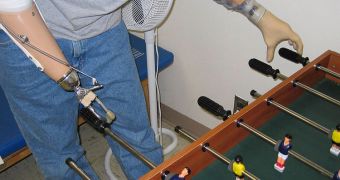According to the conclusions of a new scientific study, it would appear that the human brain displays a lot more flexibility than researchers previously gave it credit for. What this discovery means is that, one day, people needing prosthetics could be outfitted with devices that would feel as their own limbs did.
Basically, the investigation confirms that idea that thought-controlled prosthetic devices represent the future of treating amputees, people suffering from congenital defects, as well as those who became paralyzed after suffering various accidents.
This work was conducted by neuroscientists at the University of California in Berkeley (UCB) and the Champalimaud Center for the Unknown (CCU), in Portugal. The team showed that the human brain is much more trainable than previously thought.
Details of the study were published in the March 4 advanced online issue of the top scientific journal Nature. The study group explains that plasticity and neural training go hand-in-hand, since the latter would not be possible without the other.
When scientists do manage to develop neuroprosthetics, the greatest challenge will be to train the brain in how to use them properly. That is the equivalent of learning a new skill. Without neural plasticity, this would be impossible.
When it comes to the brain, plasticity refers to neurons' ability to separate from previous connections (synapses) and form new ones. The creation of new pathways is absolutely essential for learning to do new things, EurekAlert reports.
According to the research team, neural plasticity is what allows parts of the brain to learn a new motor skill – such as driving or riding a bike – even though those particular areas had not previously been used for such applications.
“What we hope is that our new insights into the brain's wiring will lead to a wider range of better prostheses that feel as close to natural as possible,” explains UCB associate professor of electrical engineering, cognitive science and neuroscience, Jose Carmena.
“They suggest that learning to control a BMI (brain-machine interface), which is inherently unnatural, may feel completely normal to a person, because this learning is using the brain's existing built-in circuits for natural motor control,” the expert goes on to say.
“Most brain-machine interface studies have been done in healthy, able-bodied animals. What our study shows is that neuroprosthetic control is possible, even if physical movement is not involved,” concludes the expert, who is also the co-director of the Center for Neural Engineering and Prostheses.

 14 DAY TRIAL //
14 DAY TRIAL //